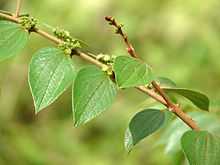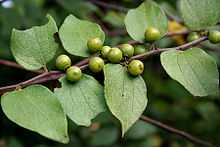Ziziphus oenoplia
| Ziziphus oenoplia | |
|---|---|
 | |
| Ziziphus oenoplia | |
| Scientific classification | |
| Kingdom: | Plantae |
| (unranked): | Angiosperms |
| (unranked): | Eudicots |
| (unranked): | Rosids |
| Order: | Rosales |
| Family: | Rhamnaceae |
| Genus: | Ziziphus |
| Species: | Z. oenoplia |
| Binomial name | |
| Ziziphus oenoplia (L.) Mill. | |
| Synonyms | |
| |

Ziziphus oenoplia, commonly known as the Jackal Jujube, Small-fruited Jujube or Wild Jujube, is a flowering plant with a broad distribution through tropical and subtropical Asia and Australasia.
Description
It is a spreading, sometimes climbing, thorny shrub growing to 1.5 m in height. The leaves are simple, alternate, ovate-lanceolate, acute and oblique. The flowers are green, in subsessile axillary cymes. The fruit is a globose drupe, black and shiny when ripe, containing a single seed.[1]
Distribution and habitat
It ranges from the Indian subcontinent through southern China and Southeast Asia to northern Australia. It grows along roadside forests and thickets.[2]
Uses
The berries are edible and the bark is used for tanning.[2]
Medicinal
The plant produces cyclopeptide alkaloids known as ziziphines and has a long history of use as an herbal medicine. In India the root is used in Ayurvedic medicine.[1] The Konkani people of Maharashtra use the chewed leaves as a dressing for wounds.[3] In Burma the stem bark is used as a mouthwash for sore throats, for dysentery, and for inflammation of the uterus.[4] Research in Thailand has found that extracts of ziziphine from Ziziphus oenoplia var. brunoniana show antiplasmodial in vitro activity against the malarial parasite Plasmodium falciparum.[5]
References
Notes
Sources
- Ara, Hosne; Hassan, Md. Abul; & Khanam, Mahbuba (2008-06). "Taxonomic study of the genus Ziziphus Mill. (Rhamnaceae) of Bangladesh". Bangladesh Journal of Plant Taxonomy 15 (1): 47–61. Check date values in:
|date=(help) - Kuvar, Sachin D.; & Bapat, U.C. (2010). "Medicinal plants used by Kokani tribals of Nasik district Maharashtra to cure cuts and wounds". Indian Journal of Traditional Knowledge 9 (1): 114–115.
- Sunit Suksamrarn, Narisara Suwannapoch, Natthachai Aunchai, Mayuso Kuno, Piniti Ratananukul, Rachada Haritakun, Chawewan Jansakul & Somsak Ruchirawat (2005-01). "Ziziphine N, O, P and Q, new antiplasmodial cyclopeptide alkaloids from Ziziphus oenoplia var. brunoniana". Tetrahedron 61 (5): 1175–1180. doi:10.1016/j.tet.2004.11.053. Check date values in:
|date=(help) - "Ziziphus oenoplia ". Ayurvedic medicinal plants. Retrieved 2010-11-02.
- "Ziziphus oenoplia ". GRIN taxonomy for plants. United States Department of Agriculture. 2010-08-19. Retrieved 2010-11-02.
- "Ziziphus oenoplia ". Myanmar Medicinal Plant Database. Retrieved 2010-11-02.